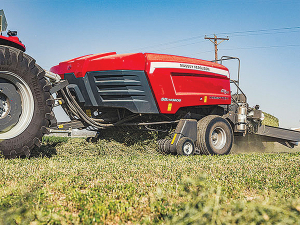AGCO and TAFE conclude commercial partnership with $260m share buyback
AGCO Corp has agreed with TAFE to resolve all outstanding disputes and matters related to their commercial relationship.
 By producing two rows of bales per pass, the machine doubles capacity, reducing the need for additional labour, equipment and fuel.
By producing two rows of bales per pass, the machine doubles capacity, reducing the need for additional labour, equipment and fuel.
AGCO has released details of the new SB.1436DB small square, or conventional baler, that rather unconventionally, produces two rows of bales per field pass, so doubling the output over a traditional single baler producing 14-by-18-inch bales.
Aimed at commercial hay producers to meet the challenges of greater field performance, unmatched bale consistency and industry- leading uptime, the SB.1436DB “addresses the increasing pressure from labour shortages, tight harvest windows and demanding quality standards,” said Dane Mosel, marketing manager, Hesston by Massey Ferguson.
By producing two rows of bales per pass, the machine effectively doubles capacity, reducing the need for additional labour, equipment and fuel. The 105-inch pickup width, said to be the widest width in the high-capacity small square baler industry, improves field efficiency and reduces labour needs by optimising movement of hay into the baler.
SimplEbale offers an advanced electronic monitoring and control system that automates critical baling processes, helping to ensure consistent bale density, weight and dimensions. From the cab, operators can monitor flake thickness, flake count, bale length and bale weight in real time, ensuring maximum throughput the working day.
“This can cost over eight hours of additional baling time,” said Mosel. “SimplEbale eliminates this issue by automating bale production, helping operators achieve better results.”
Operating at 90 strokes per minute with a 21.9-inch stroke length, the MF SB.1436DB requires a tractor of 120hp to help it deliver a target bale weight of 40 pounds, made up of 12 flakes and secured by two twines. The company suggests an operator can produce 71 bales or 1.43 tons per hour by just averaging two extra flakes per bale.
In operation, hay is conveyed into a single 14-by-36-inch chamber and separated via a splitting knife to create individual 14-by-18-inch bales. From there, it passes through a common density system that ensures consistent compression, with independent knotter trips on either side of the baling chamber for precise bale lengths.
Completed bales are dropped through the bale chute into independent rows, simplifying handling and transport. The independent knotter trips improve bale length consistency at preset lengths between 24 and 52 inches, allowing for a more standard product, despite windrow or operator inconsistency.
Twine capacity of up to 20 balls allows up to 8,000 bales to be produced before refilling, around double the capacity of comparable balers, while an automated knotter lubrication, reducing the need for frequent manual maintenance.
Fonterra’s impending exit from the Australian dairy industry is a major event but the story doesn’t change too much for farmers.
Expect greater collaboration between Massey University’s school of Agriculture and Environment and Ireland’s leading agriculture university, the University College of Dublin (UCD), in the future.
A partnership between Torere Macadamias Ltd and the Riddet Institute aims to unlock value from macadamia nuts while growing the next generation of Māori agribusiness researchers.
A new partnership between Dairy Women’s Network (DWN) and NZAgbiz aims to make evidence-based calf rearing practices accessible to all farm teams.
Despite some trying circumstances recently, the cherry season looks set to emerge on top of things.
Changed logos on shirts otherwise it will be business as usual when Fonterra’s consumer and related businesses are expected to change hands next month.

OPINION: Here w go: the election date is set for November 7 and the politicians are out of the gate…
OPINION: ECan data was released a few days ago showing Canterbury farmers have made “giant strides on environmental performance”.